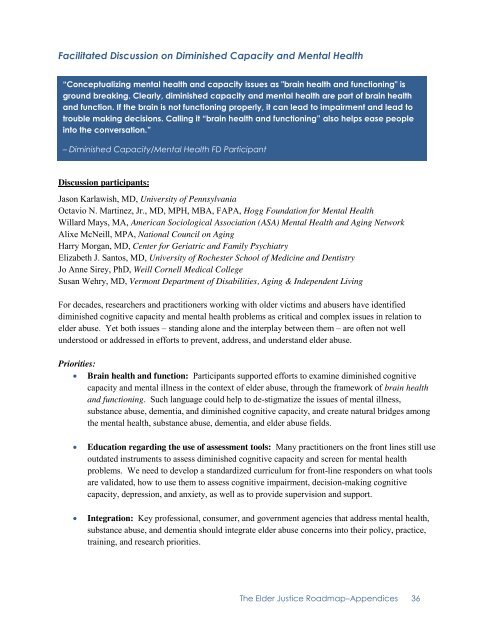The Elder Justice Roadmap
2gJRXoo
2gJRXoo
Create successful ePaper yourself
Turn your PDF publications into a flip-book with our unique Google optimized e-Paper software.
Facilitated Discussion on Diminished Capacity and Mental Health<br />
“Conceptualizing mental health and capacity issues as "brain health and functioning" is<br />
ground breaking. Clearly, diminished capacity and mental health are part of brain health<br />
and function. If the brain is not functioning properly, it can lead to impairment and lead to<br />
trouble making decisions. Calling it “brain health and functioning” also helps ease people<br />
into the conversation.”<br />
– Diminished Capacity/Mental Health FD Participant<br />
Discussion participants:<br />
Jason Karlawish, MD, University of Pennsylvania<br />
Octavio N. Martinez, Jr., MD, MPH, MBA, FAPA, Hogg Foundation for Mental Health<br />
Willard Mays, MA, American Sociological Association (ASA) Mental Health and Aging Network<br />
Alixe McNeill, MPA, National Council on Aging<br />
Harry Morgan, MD, Center for Geriatric and Family Psychiatry<br />
Elizabeth J. Santos, MD, University of Rochester School of Medicine and Dentistry<br />
Jo Anne Sirey, PhD, Weill Cornell Medical College<br />
Susan Wehry, MD, Vermont Department of Disabilities, Aging & Independent Living<br />
For decades, researchers and practitioners working with older victims and abusers have identified<br />
diminished cognitive capacity and mental health problems as critical and complex issues in relation to<br />
elder abuse. Yet both issues – standing alone and the interplay between them – are often not well<br />
understood or addressed in efforts to prevent, address, and understand elder abuse.<br />
Priorities:<br />
Brain health and function: Participants supported efforts to examine diminished cognitive<br />
capacity and mental illness in the context of elder abuse, through the framework of brain health<br />
and functioning. Such language could help to de-stigmatize the issues of mental illness,<br />
substance abuse, dementia, and diminished cognitive capacity, and create natural bridges among<br />
the mental health, substance abuse, dementia, and elder abuse fields.<br />
<br />
<br />
Education regarding the use of assessment tools: Many practitioners on the front lines still use<br />
outdated instruments to assess diminished cognitive capacity and screen for mental health<br />
problems. We need to develop a standardized curriculum for front-line responders on what tools<br />
are validated, how to use them to assess cognitive impairment, decision-making cognitive<br />
capacity, depression, and anxiety, as well as to provide supervision and support.<br />
Integration: Key professional, consumer, and government agencies that address mental health,<br />
substance abuse, and dementia should integrate elder abuse concerns into their policy, practice,<br />
training, and research priorities.<br />
<strong>The</strong> <strong>Elder</strong> <strong>Justice</strong> <strong>Roadmap</strong>–Appendices 36


